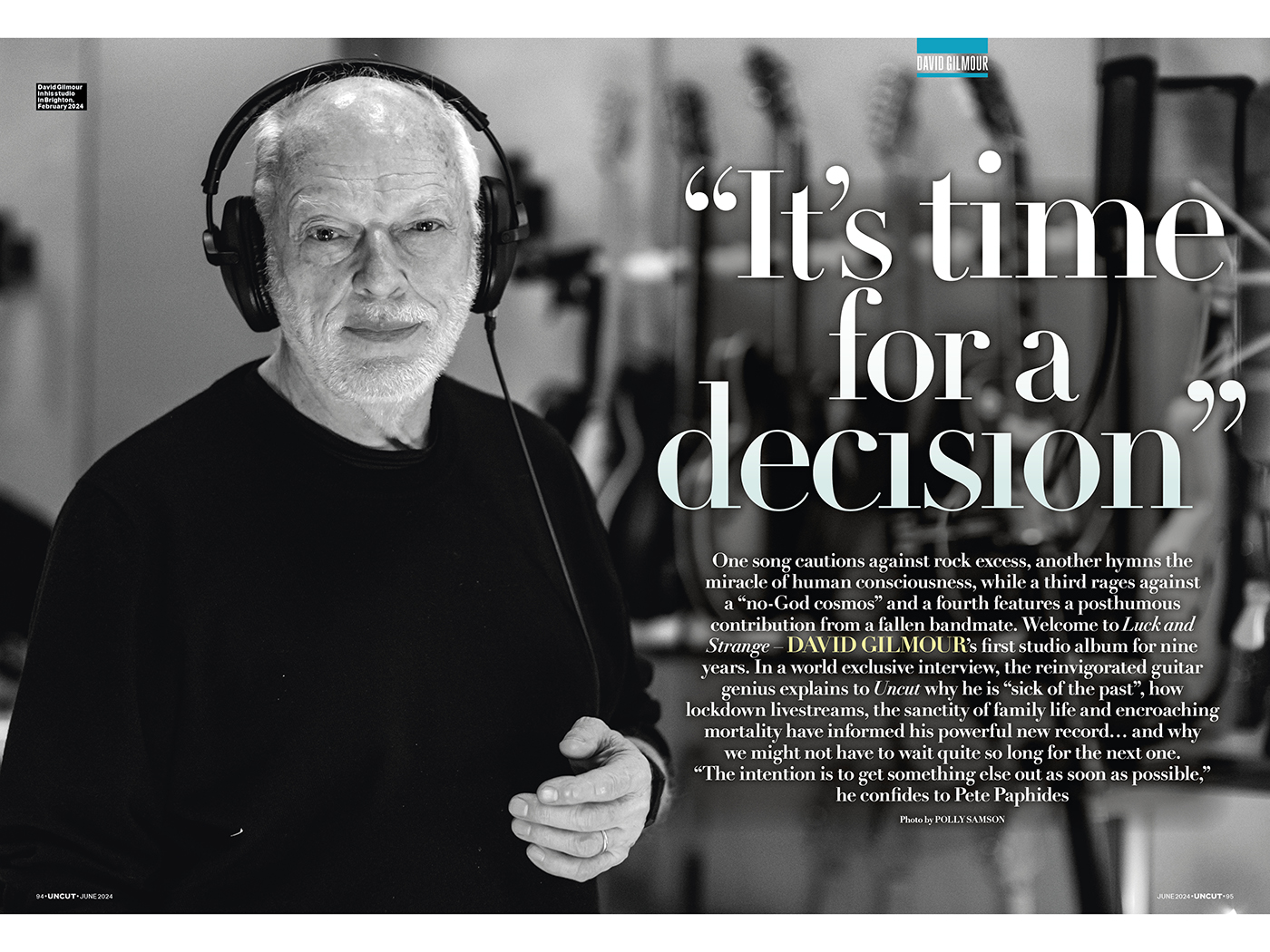David Gilmour returns with Luck and Strange, his first studio album for nine years. In this extract from Uncut's world exclusive cover feature, Gilmour, his wife and collaborator Polly Samson, bass player Guy Pratt and producer Charlie Andrew reflect on the genesis of his new album...
David Gilmour returns with Luck and Strange, his first studio album for nine years. In this extract from Uncut’s world exclusive cover feature, Gilmour, his wife and collaborator Polly Samson, bass player Guy Pratt and producer Charlie Andrew reflect on the genesis of his new album…
“Have you checked your Instagram recently?” said the message from Charlie Andrew’s manager last summer. The 42 year-old producer duly logged into the app and waiting for him was a message which said, “Hi, David Gilmour here, please give me a call.” The preceding six months had seen Gilmour and Polly Samson re-emerge carefully from their post-lockdown bubble. Weekdays were spent in a London flat they bought for the specific purpose of working in anonymity. On one floor, Gilmour growing fragments into songs with melody lines he then handed over to Samson. Cold water dips, morning walks and a record label oblivious to their industries. No pressure. And bookending the working week on their drive to and from Sussex, they listened to albums helmed by producers who may have what it takes to turn these new songs into an album.
ORDER YOUR COPY OF THE NEW UNCUT, FEATURING AN EXCLUSIVE DAVID GILMOUR INTERVIEW AND A FREE CAN CD!
There had already been false starts – “try-outs with different people, and nothing quite felt like the right fit.” During a visit to see Mark Knopfler at his West London studio, Gilmour asked him “who the good producers are these days” and neither seemed able to come up with a satisfactory answer. Gazing on in mild exasperation as “they ran through those same names,” Samson remembers thinking, “I just spent a day gathering names of people who had won prizes for music production.” More car journeys. More records. But the one name that came up time and again was Charlie Andrew – not just his work with Alt-J, but also critically feted records by Marika Hackman and Sivu.
“How does one put it?” elaborates Gilmour, “Charlie seemed like one of us. Younger, but on the same wavelength. He had worked at Abbey Road when he was young – and that’s always a tick in my box.”
Adjourning from tracking the strings that he and Gilmour recorded on a recent trip to Ely Cathedral, Andrew recalls the invitation for dinner that secured his services. “They played me some of the demos and most of my questions were for Polly rather than David. Because, for me, lyrical content is important for understanding where the song should be going.”
For Gilmour, the clincher was Andrew’s lack of baggage. “There was no pious false respect or anything like that. He shouts his mouth off about things in a very direct way, and it’s great. One of the first things he said was, ‘Why do all the songs have to fade out?’ In that moment, you realise that’s it’s just a habit you’ve fallen into. Or the other one: ‘Why do you have to have a guitar solo in everything?’ It’s refreshing to be with a person that is not overawed.”
Quite the reverse, it seems. The sessions began with “Luck and Strange”, a song which – thanks to the fragment of a 2007 jamming session around which it was written – posthumously features fallen Floyd keyboard player, Rick Wright. “Understandably,” recalls Andrew, “David kept mentioning Rick when he was talking about ‘Luck and Strange’, and I was like, ‘I’m sorry, David, I’ve got to stop you there, who’s Rick?’ But I think that’s been part of the enjoyment, I think, for David. I’m not trying to regurgitate another Pink Floyd album, or one of his solo albums.”
As well as being the song that kicked off the sessions, “Luck and Strange” also sets out the sonic and thematic reach of an album that, at times, feels like an existential audit undertaken by the man singing it. It’s a pensive, pulsing meditation on the providence enjoyed by baby boomers coming of age in a time of peace and prosperity – “demob happy street and free milk for us all”. For Guy Pratt, bassist on all of Gilmour’s Pink Floyd and solo work since 1987, the final section of that song offers a timely if inadvertent corrective to what he sees as the pernicious narrative espoused by Roger Waters in a Telegraph interview last year to plug his re-recorded version of The Dark Side Of The Moon: “[Gilmour and Wright] can’t write songs, they’ve nothing to say. They are not artists! They have no ideas, not a single one between them.” It’s a view angrily disputed by Pratt: “You only need to go right back to 1971 with ‘Echoes’, off Meddle, and listen to the final section of that song to be reminded that so much of what people loved about Pink Floyd was this musical conversation between David and Rick.”

“It’s time for a decision!” Read Uncut’s exclusive cover feature with David Gilmour in full!



